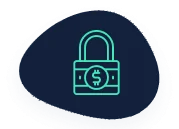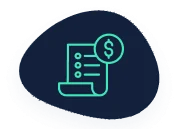For small businesses and start-ups, one of the biggest challenges you can face is getting the financing you need to be able to bring your idea to life. With no credit history and few assets, there are a number of limits that can prevent you from being approved for many traditional loans. Unsecured business loans present a great opportunity for small businesses to secure funding and allow your business to grow and flourish.
In this article, we’ll run you through everything you need to know about unsecured business loans: from what they’re used for, how to qualify, and what the differences are with secured business loans.
How do unsecured business loans work?
Unsecured business loans are a flexible approach to borrowing, whether you’re an established business or have only been trading for 6 months. Like most loans, you’ll borrow a certain amount of money from a lender with an interest rate, and have an agreed schedule for paying it back, alongside any additional fees. However, with an unsecured business loan, you do not have to secure the loan against any property or assets.
Under some loan agreements, you have to put something up as collateral as security to make sure you keep up with your payments. If you fail to pay, the lender would be within their rights to repossess the assets you put up to secure the loan. An unsecured loan circumvents this requirement, so that businesses with little to no assets or property are still able to get the funding they need for business growth, refinancing existing debt, settling debts or purchasing stock. However, you will most likely be asked to give a personal guarantee as a minimum requirement for security.
As they don’t require any tangible assets as collateral, unsecured loans tend to be very quick to arrange, as the lender doesn’t have to value the asset you’re securing the loan against. They’re also very competitively priced; providing an ideal solution for new businesses and those who don’t wish to put up any of their assets as collateral.
Are there different kinds of unsecured loans?
The term “unsecured loans” is more like an umbrella term. While traditional, unsecured business loans exist, there are also other kinds of financing that fall into this bracket that might be better suited to your needs.
Merchant Cash Advance
For small businesses who rely on card sales for payment, a merchant cash advance offers a simple way to manage cash flow. With a Merchant Cash Advance, the loan is paid back in the form of a percentage of card sales. As the lender has an insight into your monthly sales, as well as a level of guarantee in terms of your repayments, you can avoid extensive eligibility checks and you won’t have to put up any collateral.
Merchant cash advances are most suited to businesses that rely on card sales, so they’re popular for retailers. You’ll need to hit a certain financial threshold and have been trading for at least four months. In terms of how much you can borrow, we’re typically able to lend up to two times your average monthly card takings.
Revolving Credit Facility
A revolving credit facility is a line of credit which allows a business access to funds when they need it. Rather than having a single fixed sum of credit that, once you’ve paid it back, is gone, a revolving credit facility allows you to maintain access to that credit should you need it again. In principle, it’s very similar to an overdraft.
You set your credit limit with your lender, based on their affordability tests and other eligibility criteria, and then you’ll have access to that credit for the length of the agreement. Once the agreement runs out (usually after two years), you’ll likely be eligible for renewal, provided you’ve kept up with your repayments.
Typically, these kinds of arrangements are most suitable for businesses who tend to see a fluctuation in cash flows at different points of the year, or who frequently have large, unexpected expenses. It’s a much more flexible approach to borrowing as it means you can withdraw and repay money for working capital as you require.
What is the difference between secured and unsecured business loans?
The biggest difference between secured and unsecured business loans, as we’ve touched on above, is that you don’t need to put up any collateral or assets in order to be approved for funding.
There is a drawback to this, however, in that you can typically only borrow up to £500,000 if you take out an unsecured loan. As there isn’t the same level of guarantee when taking out an unsecured loan, lenders can be reluctant to loan out larger sums. Should you be looking to take out more money, you’ll need to look into a secured loan. Under this kind of financial agreement, you’ll be able to borrow up to £2M in funds.
Furthermore, because the risk associated with an unsecured loan is higher, the lender might have additional requirements for an unsecured loan in order to make sure they don’t lose out if you fail to pay. They might have more stringent credit score requirements or need more business documentation. They might set higher interest rates. Some lenders may even require a personal guarantee.
What are the advantages of unsecured business loans?
Comparing the differences between secured and unsecured business loans, you might be wondering what the advantages are of taking out an unsecured loan. In most cases, we tend to see four main benefits, especially for small businesses:
- No assets required
- Use for any purpose
- Faster approval and funding
- Flexible repayment terms
No assets required
Above all, the largest benefit that many small businesses will find when it comes to unsecured business loans is that they don’t have to worry about having suitable assets to use as collateral. In the early stages of a business, you either may not have anything suitable, or be reluctant to put any of your assets up. Unsecured loans offer an alternative so that you can still get the funding you need regardless of what stage of your journey you’re at.
Use for any purpose
Unlike many other kinds of financing, there are very few limits on what you can use your unsecured business loan for, so long as it’s for a business purpose. We typically see businesses using their unsecured business loans for things such as cash flow, business growth, stock purchases, settling bills and refinancing.
Faster approval and funding
Without any assets to value or security agreements to be drawn up, unsecured business loans can often be arranged much more quickly than secured loans. While secured loans can take up to six weeks to acquire, unsecured business loans can be arranged within 48 hours.
Flexible repayment terms
As unsecured business loans tend to be for much lower sums, they take less time to pay off. This means that lenders can offer more flexible repayment terms; whether you’re looking for a short or medium term loan. Further, most lenders won’t penalise you for settling early, and they might even allow you to make over-repayments at any time. This, again, offers much more flexibility for businesses and business owners when it comes to managing their finances.
Why choose Aurora Capital for your unsecured business loan?
Aurora Capital are experts in business funding, whether you’re a fresh start-up or an established business. With more than 7 years of experience helping our clients raise the necessary capital to grow and expand, you can rest assured that we’ll match you with the funding that best suits your business needs.
Our powerful decision engine pairs businesses looking for loans with trusted lenders who offer competitive interest rates and strong repayment terms. Whether you’re looking for secured or unsecured business loans, merchant cash advances or property finance, we have the expertise to guide you toward the best decision for you and your business.
If you’re looking to secure an unsecured loan, get in touch with our team today. They’ll be able to advise you on what you might be able to expect so you can make an educated decision on your business finances.









